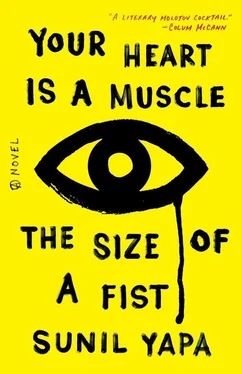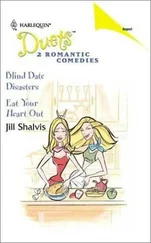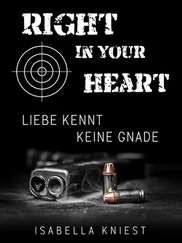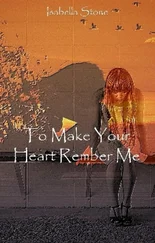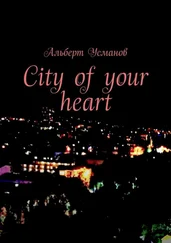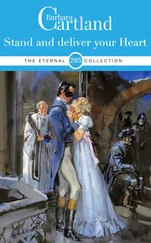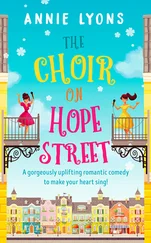“You’re freaking crazy.”
He laid his hand now on the gun itself.
“Young lady, you should really read your assessments more carefully. The FBI estimates, minimum, four to five officer deaths.”
He was close to her now, breathing in her face. Talking to her eyeballs basically, a trick her ex-husband sometimes liked to pull, sweet idiot.
“Officer deaths, Ju,” he said. “Four to five. Minimum. ”
He was full of shit. He was so full of shit it was coming out of his ears. And yet, what was it, standing here on the PeaceKeeper, that caused her to shudder? What was this premonition she felt?
“Minimum,” Park said. “Better believe. Somebody is going to catch a bullet.”
A loneliness brought on by the rain? Some dim intuition of looming disaster? Perhaps some nameless form — thought to have drowned — rising from the deep wells of memory. The nightmare images from a war and a home she knew only through the fog of half-told stories barely begun before they disappeared like the people they were about. Guatemala. A place she both missed and did not miss. A place she both knew and did not know. A home she had never really had and yet longed for regardless.
“Four to five officer deaths,” he said, counting them off on his fingers. “One. Two. Three. Four.” He put his finger on Ju’s left breast, laid it lightly against the bright brass plate that carried her name.
“Five,” he said, pointer finger pressed delicately above her heart, thumb cocked in the shape of a trigger.
“Boom boom, Ju,” he whispered, close enough now to kiss her. “Boom boom. Your family gathers in a dimly lit room.”
Gooks. Slant-eyed motherfuckers. I can smell a gook-joint from two miles away. The vitriol, the way Park’s father’s face would crumple in bitterness as if fragile enough to shatter, the way he would suck his teeth and narrow his eyes, Park didn’t understand that kind of hatred. How a person could live with that beating like a living thing inside him.
Park’s pops had been a POW early on in the war, two years living in a hole eating white worms, blind scuttling bugs, whatever he could scrape from the mud, and Park supposed that entitled him. Who knew how the darkness had deformed him, what hunger and fear had done to his father’s soul. It was odd though, because apart from the alcohol-fueled violence, only in this was his father so off, so strange. Gooks. His voice stretched thin as if traveling a wire which originated from the dampness of that dark hole and terminated somewhere in his trembling brain stem. Gooks, his voice so tortured and weird. Weird — that was the word because in moments like this it was as if his father were not his father, but would always remain that man alone in a hole looking for a bug to eat.
That and his laugh while sucking beers at the VFW and the subject of work came up. Eventually, it always did. What a weird laugh uttered from his father then. It was a laugh that said my job is not union. I am not allowed the privileges of the union because I work a crap detail as a security guard and we are not unionized. But it was a laugh that contained knowledge of what union meant — that his mother and father had both been union. That he would be union, sure, if he could, but that wasn’t his job. But his job was his job and it paid the bills and he could hold his head up. It wasn’t McDonald’s for Christ’s sake. But it was amused, too, a complicated irony because the laugh said this is the world, and I accept this fact, I am not the only one in tough times, I am not the only one working but still poor, which wouldn’t be so terrible were it not for the indignity, for the shame, for being hungry, for the sheer fucking impossibility of surviving. A laugh which said, I used to be union, but the country has changed, hasn’t it? That was the bitterness in the laugh. I used to have a union job, the laugh said, but the factory went ahead and moved, didn’t it? South of the border, the laugh said. East of the sun, the laugh said. And we fought for what exactly? The laugh said, I ain’t the only one, but that don’t mean it ain’t a crap deal neither. And who heard his father’s laugh and understood? Well, anyone within earshot who was listening heard it and understood, except for the times there was only his son, only Timmy Park listening to his old man laugh and curse, which, truth be told, were many. Because Timmy loved his father and there were not many others on earth who could say the same of the man.
Park watched a woman in a lemon-colored slicker stoop to tie her shoe, thinking, in fact, there were a lot of people who couldn’t stand his father’s hateful guts.
“Hey Ju.”
“Don’t want to hear it, Park.”
“Ju, what the fuck is with that car?”
He had his baton out and was tapping it against his knee.
“Are they filming us?”
“Park.”
“Are they fucking filming us?”
He unclasped the holster of his pepper spray.
“I’m going to check them out. See who they are.”
“Park, Chief said—”
“See who the fuck they are and why they’re filming me.”
“Park!”
He stopped.
“Take it easy,” she said. “If you refuse to return to the MACC, at least just look from here. Chief said if there was nothing immediately threatening to take it easy.”
Park looked at the car. He looked at Ju — telling him what to do for the second time today. It was all on account of the Chief busting him back like that in front of everybody. The Chief shouldn’t have done it. It was a question of respect. The ultimate social law, the law of respect. In some ways a large offense done with respect was more easily overlooked than a small offense done with disrespect. Get busted smoking a blunt on the stoop of your building — an offense, sure, but one Park would probably let slide if you nodded when you saw him coming and put it out. Get busted smoking a blunt and lean back and let a big sweet reefer cloud go drifting over his head while smirking —that was taking your life into your hands. Not because of the blunt, but because you were disrespecting him, disrespecting the badge and uniform, disrespecting his authority. When you were on the street, respect was the currency by which you lived or died. Cops and criminals alike. And the more he thought about it, the angrier he got. Because who was Ju to tell him what to do?
“Wake the fuck up, Ju. We’re on our own out here.”
He pulled his arms free of his rain jacket and draped it over his shoulder, covering his badge number and name. So pretty when she was pissed at him, he wanted to what? He wanted to put ice cream in the angle of her hip and eat it with his teeth and tongue. He stepped into the street.
She grabbed her helmet from the top of the PeaceKeeper and hopped off the running board to follow him, saying, “This is crap, Park.”
And Park, well, Ju following him. That almost made him feel better.
Almost.
He rapped the car window with his baton. Knock knock knock against the glass.
“Down,” he said.
Two men sitting in the car. Caucasian. Age approximately fifty-five to sixty. Possible homosexuals. Not that it mattered. But everything mattered. Every stray scrap of information. You didn’t know what was going to matter on a day like this. You had to pay attention. A late-model Honda Accord in robin’s-egg blue, rust spots climbing from the wheel wells like mold. A handheld digital recorder was pressed against the glass of the closed window. What were they filming down here at Pike Place Market? This was about five blocks from anything going on. Maybe they were getting ready to film? Maybe they were set up here so far from the action because they were planning something? Sometimes you had to stop a thing from happening before it even happened.
Читать дальше
